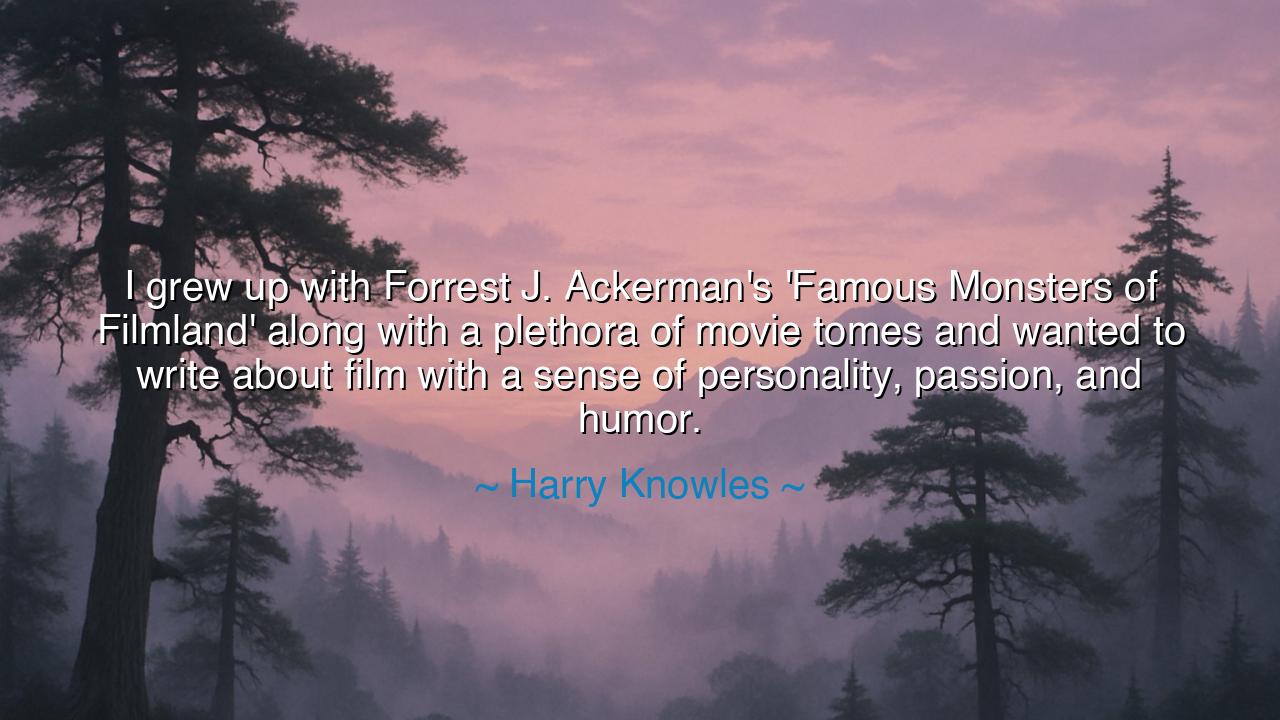
I grew up with Forrest J. Ackerman's 'Famous Monsters of
I grew up with Forrest J. Ackerman's 'Famous Monsters of Filmland' along with a plethora of movie tomes and wanted to write about film with a sense of personality, passion, and humor.






In the tapestry of life, where creativity and tradition intertwine, there emerges a voice that speaks not just with intellect, but with passion, personality, and humor—the very essence of what it means to engage with the world. Harry Knowles, in his reflection on his youth and love for film, speaks of growing up with the influence of Forrest J. Ackerman’s 'Famous Monsters of Filmland', alongside a vast collection of movie tomes, that shaped his desire to write with a voice as distinctive as the subjects he adored. "I wanted to write about film with a sense of personality, passion, and humor," Knowles says, and in doing so, he expresses a truth that transcends the world of cinema: to create something meaningful, we must infuse it with life, with our own spirit, and with the full spectrum of human emotion.
In the great traditions of the ancients, the art of storytelling was seen not as a mere recounting of events, but as an act of engagement—where the speaker or writer poured their very soul into their craft. Homer, the ancient poet, wove tales of gods and heroes, not simply to entertain, but to educate and inspire. His stories were filled with moments of both deep tragedy and profound irony, making them as much a reflection on the human experience as they were tales of adventure. Like Homer, Knowles yearned not simply to write about film, but to create a dialogue—to offer more than analysis, but an experience that resonated with the hearts and minds of his readers.
This desire to write with personality and passion is an ancient pursuit. In ancient Greece, the philosopher Aristotle wrote extensively about the importance of ethos—the character or spirit of the speaker or writer—and how it deeply influenced the effectiveness of communication. Aristotle understood that the speaker's authenticity, passion, and engagement with the subject matter would determine whether the message resonated with the audience. Knowles, in his work on film, follows this ancient wisdom. His desire to inject humor and personality into the film critique world is rooted in an understanding that the essence of storytelling lies not in detached objectivity, but in connection—the ability of the writer to connect with the audience on an emotional, almost intimate level.
Just as Forrest J. Ackerman's 'Famous Monsters of Filmland' was not merely a magazine about monsters, but a celebration of imagination, so too did Knowles seek to write about film not with cold, clinical detachment, but with the kind of passion that could enchant his readers. Ackerman, much like the ancient bards, understood that film was more than just entertainment—it was a cultural force, a universal language that connected people across time and space. By bringing together his knowledge of film with his personality and a sense of humor, Knowles, like Ackerman before him, made the world of cinema feel alive—not just a subject to be discussed, but a shared experience that could stir the soul.
Humor, too, plays a vital role in this equation. In ancient texts, humor was often used as a means of softening the blow of harsh truths, to make the unbearable bearable. Aristophanes, the great comedic playwright of Athens, used humor to expose the follies and vices of his time, but in a way that invited his audience to laugh and think deeply about the absurdities of life. In the same vein, Knowles understood that humor could disarm the often serious world of film criticism, turning it from a dry, academic exercise into something engaging and fun. By mixing humor with his analysis, Knowles didn’t just entertain—he invited his audience into a world where laughter and reflection could coexist, a world where the human experience of film was celebrated with both sincerity and joy.
The lesson that Knowles imparts is clear: the act of creation, whether through film, writing, or any other form of artistic expression, is most powerful when it is infused with both personality and passion. The greatest works are not those that stand aloof from their creators, but those that come from the very heart of the creator, from their deepest joys and fears, their quirks and their truths. Whether you write, speak, or create, it is vital to engage with your subject matter not just with your intellect, but with your soul—to bring all of yourself into the work and to share that with the world.
So, as we embark on our own journeys of creation, let us take the wisdom of Knowles and the ancients to heart. Let us write, speak, and create not with cold detachment, but with personality, passion, and humor. Let us infuse our work with the spirit of life, knowing that it is through this engagement—this wholehearted connection with our subject matter—that we will move others, that we will create works that endure. For when we pour our full selves into our craft, when we blend intellect with heart, we create not just art, but a living legacy, one that will resonate with others for generations to come.






AAdministratorAdministrator
Welcome, honored guests. Please leave a comment, we will respond soon